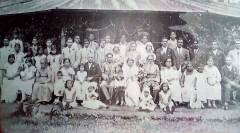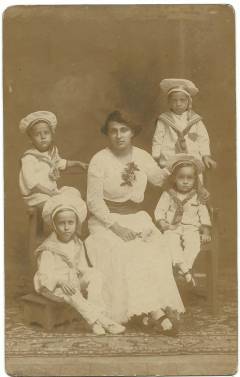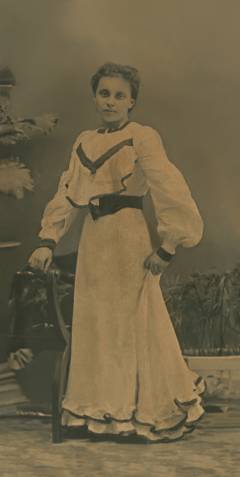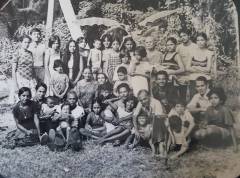The suggested way to start your family research is by doing “offline” research. This involves talking to people and visiting places. It’s best to start with the people who are closest to you and work your way outwards. You’d be surprised at how much information you can gather by just talking to people.
Immediate family
Start by interviewing your immediate family members. Ask them about their childhood memories, family history, and any stories they may have heard from older relatives. Take notes or record the conversation for future reference. It’s important to start with your immediate family members because they are the ones you have the most access to, and the memories are the freshest in their minds.
Extended family
Once you’ve interviewed your immediate family members, it’s time to reach out to your extended family. Give them a call and arrange a day to go and meet them if they are living not too far away.
During these conversations, ask questions about their own memories and stories they may have heard from other family members.
Distant family
These are family members that are distantly related to you – people you’ve heard about only through the stories of your family members. Simply put, you don’t know these people and they don’t know you. So at first, it can be a bit daunting trying to connect with these people who are practically strangers. Here’s the approach I take:
I get their phone number(email works too) from one of my relatives and give them a call. I give them my name, quickly state how I am related to them and state my purpose. I make sure to mention that I got their phone number through a common relative that we both know. If they don’t live too far away, I would ask if we can set up a day to meet up. I usually set the meeting place to their house because I don’t want to inconvenience them. If meeting them is not possible, ask them for a day and time when they would be free for 20 minutes or so for a phone call. If I’m meeting them in person, I try to go bring an older relative of mine who is related to this person I am going to meet.
I usually take one of my grandparents along. Having a familiar face during the meeting could help the person we are meeting ease up. Also, there’s a chance that the stories recalled might jog some forgotten memories of my grandparent.
During the conversation smile and be enthusiastic. Try to make it less of an interview and more of a casual conversation. If they offer any drinks or snacks, don’t refuse – say “yes, thank you”. If they offer any homemade snacks, be sure to compliment them on the taste of the snack regardless of how the snack tastes.
After the conversation is over, if they seem enthusiastic about your endeavour, keep in contact with them and give them updates on the progress of your project.
Questions to ask family members
Here are some questions to ask your family members during your interviews:
- Do you know anyone in your family that was interested in family history?
- This is the first question you should ask. If there was someone who might have compiled a family genealogy, your work is already done for you!
- Can you give me the names, dates of birth and death dates of your parents?
- When and where were your parents married?
- If they don’t know their parent’s marriage date, ask the following three questions.
- Who is the oldest in your family? When were they born? Do you know if your parents had any children prior to having the oldest – a child who could have died young?
- Using this information you can estimate the marriage date. From my experience, couples usually have children within about 5 years of marriage.
- What do you remember about your grandparents?
- Do you know the birth dates of your grandparents?
- If they don’t remember this, ask them the following three questions
- Do you remember attending your grandparent’s funeral? If so, do you remember the death date of your grandparents? About how old were they when they died?
- If they have an answer to these three questions, you can get an approximate year for the birth date. If they don’t remember the death date because they were too young, ask the following questions.
- About how old were you when your grandparent died?
- You can use the birth year of the relative you are speaking to, along with the answer to the above question for an approximate death year of their grandparent.
- When and where were your grandparents married?
- If they don’t know the answer to this question, you can use the same line of questioning used above to find the marriage year of their parents.
- Were your grandparents buried? If so, which cemetery?
- Do you know or remember anything about your great-grandparents?
- Are there any family traditions or stories you remember?
- Where in Sri Lanka are your parents/grandparents from?
- Did your ancestors belong to a certain caste? If so which caste?
For the above questions, I’ve just used “parents” and “grandparents” as the persons of discussion. You should ask about all other family members as well. Children, siblings, uncles, aunties, grand-uncles, grand-aunties, in-laws, you name it!
How to record their memories
As you’re asking you are conversing, make sure to take notes or record the conversation. You can use a notebook or the voice recorder on your phone to document the conversations. Make sure that you let the people know ahead of time that you will be recording the conversation. Consider transcribing the conversation for easier reference later on.
Visit cemeteries
Visiting cemeteries can also be a valuable source of information for family research. Look for gravestones with family names and take note of dates and any inscriptions. Take photographs of your ancestor’s tombstones.
Overall, offline research is a great way to connect with your relatives and learn more about your ancestors. Start by interviewing your immediate family members and reaching out to your extended family. Don’t forget to take detailed notes and record the conversations for future reference. And, of course, don’t be afraid to visit cemeteries to learn more about your ancestors. Happy researching!







